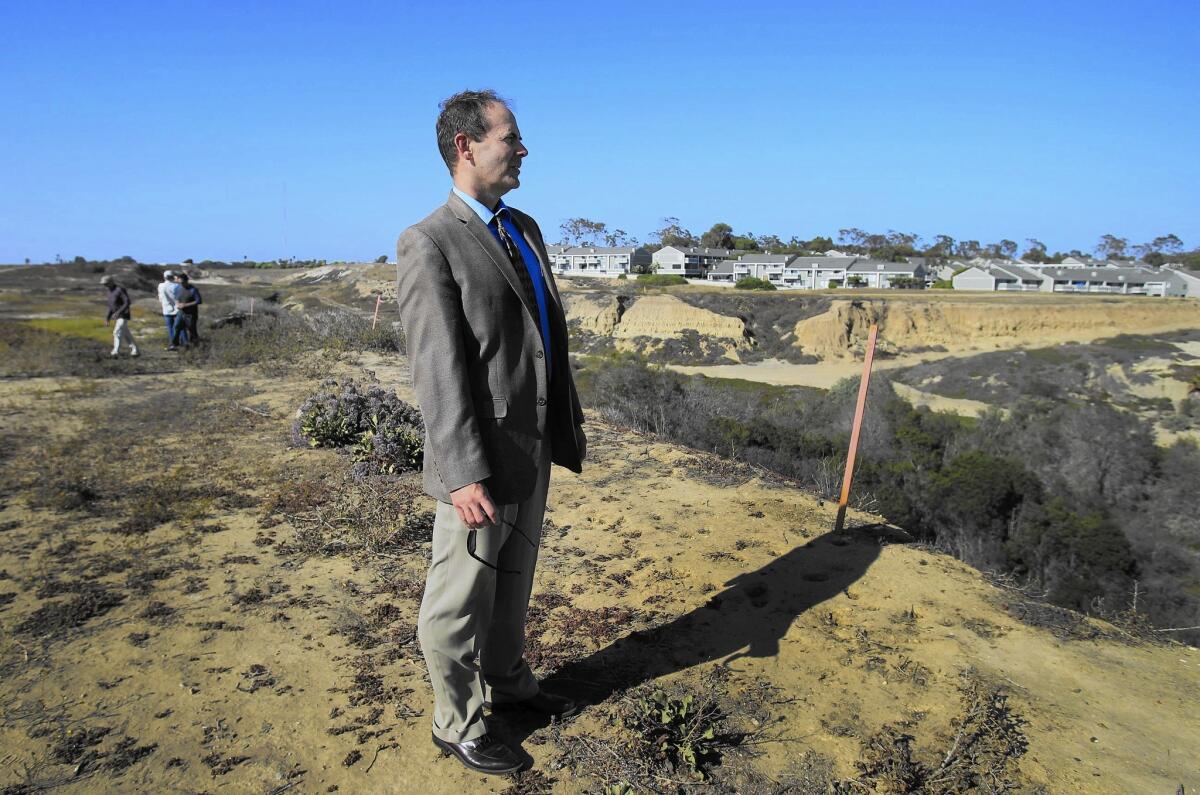Big turnout is expected at a showdown over the Coastal Commission chief’s future

The California Coastal Commission will meet Wednesday in Morro Bay to decide the fate of Executive Director Charles Lester. Environmental groups up and down the coast oppose his ouster.
- Share via
For more than four decades, the California Coastal Commission has policed land use and preserved public access along more than 1,100 miles of shoreline — some of the most valuable and scenic real estate in the nation.
Now an internal battle over whether to fire its executive director has set off an intense public fight over the direction of the agency and its ability to control development and protect the state’s vast coastal resources.
On Wednesday, the commission will consider ousting Charles Lester, a 23-year veteran of the agency, during its regular meeting in Morro Bay. If he is removed, it would be a first in the agency’s history.
Lester is the target of a group of commissioners, including appointees of Gov. Jerry Brown, who have questioned the director’s management and leadership abilities. But their efforts to focus the discussion on job performance have been met with a torrent of outrage.
Environmental groups, elected officials and members of the public up and down the coast have registered vociferous opposition, arguing that the commission’s real motive is to shift the agency more toward development interests.
The objections promise to make Wednesday’s hearing less about Lester and more about the commission and its decisions in recent years, which many say already reflect a tilt toward developers and a growing coziness with them.
“What we take for granted today — that spectacular drive along the Pacific Coast Highway, the sweeping vistas of Big Sur, the small, older motels offering families friendly, affordable accommodations, the wildness of the coastal redwoods, the last great coastal open spaces in Southern California not yet overrun by wall-to-wall development and gated communities — all of that is at risk of disappearing, decision by decision,” said Susan Jordan, director of the California Coastal Protection Network.
Mel Nutter, a Long Beach attorney who served on the panel from 1977 to 1985, contends that the stated reasons for firing Lester are a smoke screen. This is “about the direction of the Coastal Commission and whether we’re going to see a professional, independent staff or a politically driven agency,” he said.
Nutter has sent a letter to commission Chairman Steve Kinsey signed by 35 former members opposed to firing Lester, whom the panel unanimously appointed in 2011. It’s one of more than 20,000 emails and letters, including one signed by 153 current staff members, that have arrived at the agency as of Friday voicing opposition to removing the executive director.
Lester’s supporters question the commission’s timing because it coincides with a number of major projects requiring evaluation to determine whether they comply with the California Coastal Act of 1976. The law sets priorities, requirements and significant restraints for coastal land use.
Those projects include a large desalination plant in Huntington Beach and the Newport Banning Ranch — a plan for hundreds of homes, a hotel and commercial development on 401 acres of arroyos, mesas, wetlands and oil operations overlooking Newport Beach.
See the most-read stories this hour >>
A Coastal Commission report describes the Banning Ranch site as “the largest and last remaining privately owned land of its size along the coast in Southern California.” The plan has been in development for a decade and is backed by real estate company Brooks Street, Cherokee Investment Partners and Aera Energy, which is jointly owned by Shell and Exxon Mobil.
“It’s a poster child of how the Coastal Act sometimes frustrates people who want to build big developments on the coast,” said Terry Walsh, president of the Banning Ranch Conservancy, a nonprofit that has fought to preserve the land as open space.
“You have really, really powerful people pushing this huge project forward, and they have tremendous amounts of money, deep pockets,” Walsh added. “But under the Coastal Act, you can’t just build a project like that.”
Last fall, agency staff members recommended denial of the Banning Ranch project after a biological review found endangered species and more than half the land covered with environmentally sensitive habitat and wetlands.
The finding has been challenged by some commissioners, including Brown appointees. The commission is scheduled to consider the project at a meeting next month.
According to the developer, the environmentally sensitive areas are not as extensive as the commission staff has said. However, the partnership has scaled back the size of the residential project from 1,375 to 895 homes to address some of the concerns.
Environmentalists point to other examples that they say suggest a troubling closeness between commissioners and development interests.
On Nov. 18, commission Vice Chairwoman Dayna Bochco and Susan McCabe — a consultant who has clients with business before the panel — co-hosted a reception and fundraiser for then-Assemblyman Anthony Rendon (D-Lakewood), who last month was elected speaker of the chamber and will have the power to appoint as many as four coastal commissioners.
Two other coastal commissioners, as well as consultants and companies with business before the commission, attended the event. Days later, some gave donations of $1,000 to $2,500 to Rendon, according to campaign disclosure statements.
Among them was Poseidon Resources, which plans the desalination plant in Huntington Beach, and D.B. Neish Inc., an Orange County consulting firm that represents Newport Banning Ranch and other major projects before the commission.
Bochco, who is active in Democratic Party politics, defended her attendance at the fundraiser, saying Rendon was a longtime friend and one of many elected officials whom she has supported over the years.
“I doubt that it is unusual for businesspeople of all stripes to support candidates for office,” Bochco said. “The co-host list for Speaker Rendon was not dictated by me. I was one of many, I believe.”
David B. Neish said the Rendon fundraiser was one of a number of political events his firm has attended, but he had no further comment.
Another example highlighted by environmentalists is the commission’s involvement with a proposed single-family residential development in Seal Beach. Commission staff members recommended denial on grounds that single-family housing is a low priority under the Coastal Act because it is a use that benefits only a few people.
Staff members favored plans for a hotel instead because it would be open to the general public. But at a hearing, commissioners negotiated directly with developers from the dais and approved the housing project.
Kinsey, the commission chairman, defended the action, saying it was difficult to get a workable proposal out of the commission staff.
Join the conversation on Facebook >>
“They did not give us a suggestion of what could be done,” Kinsey said. “We ended up with housing, visitor serving facilities and a public park. We view this as a success.”
The move to fire Lester has stunned his former colleagues, some of whom say he is intelligent, hardworking and dedicated to the agency’s mission.
Lester, a former college professor, has a bachelor’s degree in geochemistry as well as a law degree and a doctorate in jurisprudence and social policy from UC Berkeley. After years as the second in command of the commission’s staff, he was handpicked by former Executive Director Peter Douglas to succeed him.
If Lester is dismissed, coastal protection will suffer a serious setback, said Les Strnad, a 25-year veteran of the agency and a former deputy director for the central California district.
“His knowledge of California law and coastal management is unparalleled, Strnad said. “He is ethical, very professional and looks for solutions. He is not a “no” man and is willing to sit down and see how a project might be able to work. This is a witch hunt.”
Kinsey disagreed, saying commissioners have concerns about “management, leadership, trust and confidence” involving Lester and the staff. He said problems have existed since roughly half the commissioners were replaced in 2011, after Douglas’ retirement.
“We hear from applicants that they can’t get their e-mails answered, that they can’t get their calls returned,” Kinsey said. “Commissioners feel they are not getting the attention from staff when they call for it. There has been a feeling that staff has tried to impede the commission’s understanding of projects that were coming before them.”
Kinsey defended the commission’s decisions, noting that 90% to 95% of project approvals are consistent with staff recommendations.
Some critics mentioned what they thought were unnecessary and costly delays in recent approvals for a sand replenishment project for Broad Beach in Malibu and the construction of five mansions in the Malibu hills by David “The Edge” Evans, guitarist for the rock group U2. Both projects took five years to clear the commission.
“The process is often a black hole, with people not knowing what the rules are and commission staff taking a very long time to get items to the agenda,” said Fred Gaines, a Calabasas councilman and attorney who has represented developers and property owners before the panel for 25 years.
Dissatisfaction among commissioners is “a long-held frustration, but there’s a feeling that it’s gotten worse,” Gaines said in a recent interview.
Agency records show, however, that the commission has been denying fewer permits to projects in recent years, voting to reject 24 over the last four years. In 2006 alone, the commission issued 26 denials.
Streamlining requirements have helped reduce a backlog of permit applications, and a report by Lester last year concluded that an increase in staffing since the recession has allowed the agency to process appeals more quickly.
The agency also began addressing sea-level rise and secured about $8 million in additional funding for various coastal planning efforts and to hire 25 more employees, according to a memo from Lester to the commission released Thursday night.
Nevertheless, the commission has tried to exert greater control over the day-to-day activities of Lester and his staff.
In 2013, commissioners adopted a five-year strategic plan that includes a “dashboard” to track the status of 163 specific actions required of Lester and his staff.
Some commissioners, including Mark Vargas, who was reappointed to the panel by Assembly Speaker Toni Atkins in 2015, wanted much more detailed metrics on how Lester and his staff use their time, but abandoned the effort after public opposition.
Over the last few years, commissioners have spent about 25 hours in closed-door performance reviews of Lester, including lengthy annual evaluations and several check-ins a year, according to people familiar with the matter.
Such frequent reviews were not required of his predecessor, leaving some to suspect the increased scrutiny was intended to force the agency’s staff to be more accommodating to commissioners, and eventually, as a pretext to fire Lester.
Wednesday’s hearing, which is expected to last much of the day, will probably include hours of testimony from Lester, the public, elected officials and supporters as well as critics of the commission’s work. Hundreds of people are expected to attend.
Commissioners may deliberate and vote on the executive director’s fate in public or behind closed doors. They must disclose any vote taken in closed session.
An attempted ouster has gone to a public hearing only once before, in 1996. Then, commissioners backed down after hundreds turned out in support of former director Douglas.
Lester, in his memo defending his performance, said he asked for a hearing on his termination “as much for the public as for my desire to continue as the commission’s executive director.”
Lester added, “I believe the public should be heard.”
Follow on Twitter: @LADeadline16
Follow on Twitter: @Tonybarboza
ALSO
Calendar says winter, but it’s hot and dry: Has El Niño abandoned L.A.?
L.A. homeless plans near approval, but where will the money come from?
More to Read
Sign up for Essential California
The most important California stories and recommendations in your inbox every morning.
You may occasionally receive promotional content from the Los Angeles Times.












